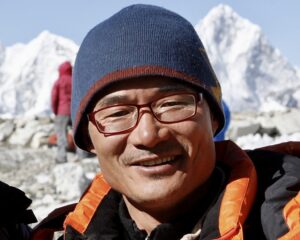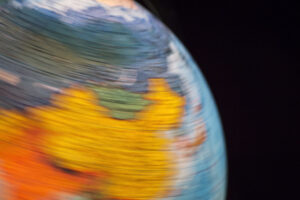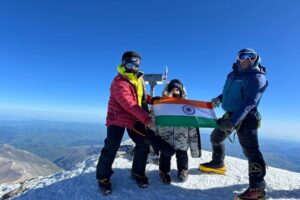COVID cases in Everest Base Camp are multiplying, but the government of Nepal clings to a strategy of denial, censorship, and threats.
COVID infections continue to spread not just at Everest BC but along the Khumbu. At Everest Base Camp, cases might be 10 times the four known infections, according to Alan Arnette. Sources in Kathmandu spoke of about 20 people evacuated with COVID symptoms. However, hospitals are not allowed to provide information on patients. Nor are the expedition outfitters or the climbers themselves.
Censorship
Some people in contact with the climbing teams report censorship and threats to the outfitters. The government has warned them that they will be “treated unfavorably” when applying for climbing permits next year if they spread the news of the COVID outbreak at Everest Base Camp.
Tourism officials “have been reportedly making individual phone calls to doctors where COVID-infected climbers were treated, doctors at EBC, and expedition agencies to block COVID info,” the Everest News blog tweeted. “Outsiders or media [are] not allowed at EBC tents without permission.”
It went on: “A group of outsiders who recently visited EBC after an outfitter allowed them, tested positive for COVID-19 before returning to Lukla. [They] are now receiving treatment in Kathmandu.”
Everest Base Camp, population 1,000
According to the Department of Tourism, the number of permits for Everest reached 394 yesterday, breaking 2019’s record. With guides, cooks, and other staff, Everest Base Camp is essentially a small, cramped town with a population of 1,000.
Alex Txikon, on his way to Everest for a no-O2 ascent, is concerned but is going ahead, he told ExplorersWeb from Pheriche today. “I brought a fresh negative PCR test from home, and I took another after arriving in Kathmandu,” he said. “Once I got the negative result, I could leave for the Khumbu.”

Alex Txikon, today in Pheriche, worries what he might find in Base Camp. Photo: Alex Txikon
Other sources told ExplorersWeb that forged PCR certificates are easy to obtain in Kathmandu, for about $60. So while Txikon got a proper test, it is not clear whether every visitor has bothered to do so.
COVID worsening throughout Nepal
Meanwhile, the situation in Nepal itself is worsening quickly, largely thanks to the 1,770km long porous border with COVID-ravaged India. The border closed during the virus’s first wave last year, but it has since reopened.
Kathmandu will enter another lockdown on Thursday, and road transportation will cease. A second border closure is under discussion.
We don’t know how this could affect climbers and trekkers in the Himalaya. For now, both international and domestic flights are operating normally.
Denying evidence is not a good strategy. News leaks from Base Camp anyway, increasing the uncertainty and seriously damaging the credibility of official sources. Reality contradicts the Department of Tourism’s “Good News Only” politics.
In Nepal, the number of active cases surpassed 20,000 today, according to The Kathmandu Post. “The country reports 3,442 new cases and 12 deaths,” it stated.
“We have detected the UK variant and the double-mutant variant detected in India,” Krishna Prasad Paudel, the director of Nepal’s Epidemiology and Disease Control Department, told Reuters.
Hospitals near the Indian border are already crowded and in a precarious situation. Nepal’s vaccination campaign has nearly ceased because of shortages. Most vaccines come from India, which is dealing with such horrid infection rates that it has stopped exporting vaccines. It needs them for its own population.

The Narayani Hospital, near the Indian border. Photo: Niraj Singh/The Khatmandu Post
Hospitals in crisis
“The virus is mutating very fast,” said Rabindra Pandey, a public health expert. “What started in India has now entered Nepal.” If the trend continues for another week, he adds, the already-stretched hospitals will run out of beds.
Nepal’s former king Gyanendra and his wife tested positive for the virus after returning from India to attend a religious festival. They are undergoing treatment at a private facility in Kathmandu.
“The situation is really frightening,” said Prakash Thapa, a doctor at Bheri hospital in Nepalgunj, a city bordering India.
He said the hospital was inundated with coronavirus patients requiring intensive care and ventilators.
“Even children and young people come in critical condition, and patients are even sleeping on the floor and corridors,” he said.





